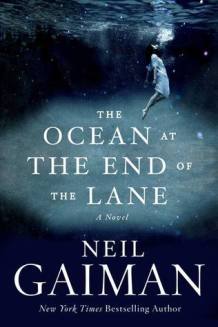Neil Gaiman’s newest novel is a window back into a world that we all, at one time or another, used to be a part of. It is a confounding, lighthearted, at times terrifying, and always thoughtful look into the way our memories of childhood are not always what they seem. What was supposed to be, according to Gaiman, another short story, quickly became a novel when he simply couldn’t stop the words from flowing. You can really tell he felt inspired to write, throughout the books short 192 page lifespan. Is The Ocean at the End of the Lane an interesting anomaly, from a modern master of fantasy, or is it another masterpiece?
At its heart, this book is simply a fairytale about a young boy. Our protagonist has few friends his own age, and is constantly lost in books. He has the requisite overactive imagination, and distrust of authority, that comes equipped with any good adventure hero. He is instantly likable, and is very relatable, hailing form Gaiman’s own childhood home of Sussex County, England.
We first join the narrator (who is never named) as a grown man, on a visit the small country town he lived in as a child. He is in town because he has been tasked with delivering the eulogy at a funeral in the area, and has decided to sneak away from grieving friends and family members for a bit. He ends up at the house a girl he knew briefly, as a seven-year-old boy. Her name was Lettie Hempstock, and at the time of their meeting she was eleven. He knocks on the front door to see if her family still lives on the same farm. They do, but she is not home, and he is greeted by her mother… or is that her grandmother? His memories of his experiences at the Hempstock farm are as cloudy as they are confusing, and this runs as a constant theme throughout the story.
We are then whisked back to the tale of his adventure with Lettie’s family, and of the peculiar job the Hempstock women are here on earth to do. We are treated to some legitimately horrifying confrontations, with positively malevolent forces, and in turn we are also shown the simple, quiet moments that make the life of a young boy so incredible. Gaiman’s conversational delivery, and his razor sharp wit shine throughout. Even without fully understanding the goings on in this strange little town, we are still privileged to be taken along for the ride.
Here in lies the divide between the reader who will adore The Ocean at the End of the Lane, and the one who may want to pass on it. This is simply not a story for someone who needs everything explained, and all conflicts to be fully resolved. It simulates, with great success, the haziness of memory when looking back at our lives as children. Our narrator merely tells us things as he recalls them, admitting full well that the memories are not exactly crystal clear. The novel asks us to let go of our adult urges to control, and understand, and to just thrill to the adventure of it all.
 I would be remiss if I didn’t bring up something that really bothered me though… what is up with the cover art? This is the kind of thing that explains the origin of old adage “don’t judge a book by its cover.” This book seriously looks like melodramatic teen romance, or old lady fiction. So, you know what? Fuck that. I’m judging a book by its cover. The font, the artwork, the layout, the stupid frayed-edges on the pages. Is this a novel about otherworldly demons trying to brain rape kids, or the newest sequel to The Secret? This may feel like a petty gripe, but to me the presentation and feel of a book is a really important part of the entire experience. I like to look at a book and feel like its an undertaking I’m proud to take on. With this book, I felt like a complete douche reading it on the subway. Anyway–Rant over.
I would be remiss if I didn’t bring up something that really bothered me though… what is up with the cover art? This is the kind of thing that explains the origin of old adage “don’t judge a book by its cover.” This book seriously looks like melodramatic teen romance, or old lady fiction. So, you know what? Fuck that. I’m judging a book by its cover. The font, the artwork, the layout, the stupid frayed-edges on the pages. Is this a novel about otherworldly demons trying to brain rape kids, or the newest sequel to The Secret? This may feel like a petty gripe, but to me the presentation and feel of a book is a really important part of the entire experience. I like to look at a book and feel like its an undertaking I’m proud to take on. With this book, I felt like a complete douche reading it on the subway. Anyway–Rant over.
In summation, this book is what would happen if Roald Dahl and H. P. Lovecraft got together to cowrite The Bridge to Teribithia. can’t go on enough about what a joy to read this was for me, but I am not entirely positive it’s for everyone. I think though, that when you’re talking about Neil Gaiman, thats par for the course. In my mind this is another big success from one of our era’s greatest literary voices.
FINAL VERDICT: RECOMENDED


Pingback: Book Review: The Ocean at the End of the Lane by Neil Gaiman | caughtwithinpages